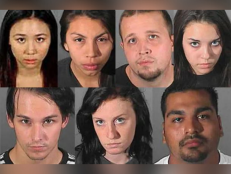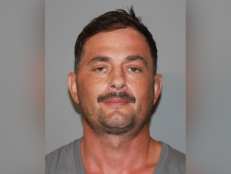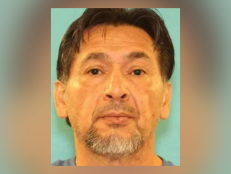Kansas Man Wrongfully Imprisoned In 'Bizarre' Doppelgänger Case Awarded $1.1 Million
Richard Anthony Jones calls finding a new suspect and going free after 17 years behind bars “an overwhelming feeling.”
![Ricky Amos and Richard Anthony Jones [Kansas Department of Corrections]](http://investigationdiscovery.sndimg.com/content/dam/images/investigationdiscovery/crimefeed/legacy/2019/01/Ricky-Amos-Richard-Jones-Kansas-Dept-of-Corrections-01172019.jpeg.rend.hgtvcom.616.347.suffix/1547746681608.jpeg)
Ricky Amos; Richard Jones [Kansas Department of Corrections]
Ricky Amos and Richard Anthony Jones [Kansas Department of Corrections]
OLATHE, KS — The state of Kansas will pay $1.1 million to a man who was set free in 2017 after he spent almost two decades in prison for a crime his doppelgänger may have committed.
"I hoped and prayed every day for this day to come, and when it finally got here it was an overwhelming feeling," Richard Anthony Jones told ABC News at the time of his release.
In 1999, then-28-year-old Tamara Scherer was walking in a Walmart parking lot in Roeland Park on Memorial Day when a man tried to steal her purse. The assailant escaped in a waiting car with only her cell phone, but Scherer, who fought back, fell during the struggle and scraped her knees, so police classified the crime as the more serious offense of aggravated robbery.
No physical evidence, such as fingerprints or DNA, was left at the scene.
The most solid lead came from three addicts who had been smoking crack all day. Police eventually tracked down the men because an eyewitness got their license plate number. They claimed they had picked up a guy they only knew as Rick while out looking for more drugs shortly before the robbery. Their new acquaintance told the trio to drive him to the Walmart parking lot, where they watched as he committed the crime.
Three months later, police zeroed in on Jones, now 42, when one of the addicts, who admitted his memory of the day was foggy, pointed out his picture in a police database.
The victim never saw her assailant’s face, but other witnesses, including a Walmart security guard, were also able to pick Jones out of the six-photo lineup cops assembled.
Despite these identifications, cracks in the case quickly became evident.
Defense attorneys argued that the lineup was “highly suggestive” since none of the mug shots, except Jones’, was that of a “light-skinned Hispanic or African-American man" with “long hair pulled back,” as the witnesses had described.
The victim recalled seeing a tattoo on her attacker’s left arm. Jones did not have one. But what Jones did have was a solid and corroborated alibi: He was celebrating his girlfriend’s birthday party in nearby Kansas City, Missouri, when the robbery went down.
Still, a jury found Jones guilty, and a judge sentenced him to 19 years in prison.
Jones always denied he'd had anything to do with the crime, but it would take years of incarceration before he could convince the court. One day, said his attorneys, prisoners asked Jones why he hadn’t said "Hi" back to them in the cafeteria. Others began talking about how much he resembled another man who was in prison with them.
Incredibly, members of the Innocence Project tracked down the lookalike, Ricky Amos, and noted his name was the same the addicts had recalled; he lived near the Walmart at the time of the robbery; he bore a striking resemblance to the suspect description — and to Jones.
![Ricky Amos and Richard Anthony Jones [Kansas Department of Corrections]](http://investigationdiscovery.sndimg.com/content/dam/images/investigationdiscovery/crimefeed/legacy/2019/01/Ricky-Amos-Richard-Jones-a-Kansas-Dept-of-Corrections-S1172019.jpg.rend.hgtvcom.616.411.suffix/1547746874522.jpeg)
Ricky Amos and Richard Anthony Jones [Kansas Department of Corrections]
“We were just like, holy crap,” Alice Craig, lead attorney for the University of Kansas School of Law Project for Innocence, has said.
Jones’ new legal team, including Craig, presented the doppelgänger, Amos, as an alternative suspect in a 2017 court hearing.
“I am no longer certain I identified the right person at the preliminary hearing and trial,” Scherer, the victim, noted in an affidavit. “If I had seen both men at the time, I would not have felt comfortable choosing between the two men and possibly sending a man to prison.”
A second eyewitness echoed her statement, and a judge tossed Jones' conviction. He walked out of prison a free man in June 2017.
"We spoke at the hearing, and he was appreciative and I wished him luck,” John Cowles, the former prosecutor on the case, has said. “I realized that we had very unfortunately convicted the wrong man” in a case based “solely on eyewitness testimony.”
Current Johnson County District Attorney Steve Howe reportedly has called Jones’ wrongful imprisonment "one of the most bizarre scenarios that I've seen in my 27 years of prosecuting cases.”
Though Amos is now a strong alternative suspect, even if he did actually commit the robbery, an accusation he has denied, he can never be tried and prosecuted since the statute of limitations has long since passed.
Craig has said that despite the years lost in prison, her client, Jones, doesn’t hold any ill will toward Amos, but he is “somewhat disappointed” that his lookalike “has never admitted to the crime.”
Jones is the first person to settle a lawsuit with Kansas under the new mistaken-conviction state statue. His exact compensation, $1,103,945, is equivalent to almost $65,000 for each year he spent behind bars. He will also receive two years of health care, counseling, and a certificate of innocence. The state will expunge his record related to the case and destroy DNA samples collected after his arrest.
"In this case, it was possible on the existing record to resolve all issues quickly, satisfy all of the statute's requirements, and agree to this outcome so Mr. Jones can receive the benefits to which he is entitled by law because he was mistakenly convicted,” Kansas Attorney General Derek Schmidt said.
Read more: NBC News, CNN, ABC News, MSN, The National Registry of Exonerations, The Washington Post


![Christina King [left] and Sameemah Mussawir [right] were identified as victims of the same killer by the Kansas City, Kansas Police Department’s cold case unit.](http://investigationdiscovery.sndimg.com/content/dam/images/investigationdiscovery/crimefeed/legacy/2023/09/kansas-city-police-department-christina-king-sameemah-mussawir-92623.png.rend.hgtvcom.231.174.suffix/1695741317459.png)






